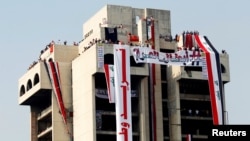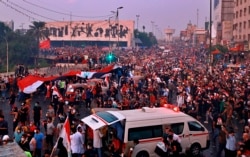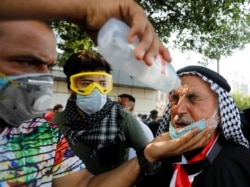As hundreds of Iraqi protesters are hunkered down in Baghdad's central Tahrir Square and other provinces, analysts say the country is facing a precarious moment, one which bold and concrete action is needed from the government. But can and will Iraq's leadership deliver? A renewed wave of anti-government demonstrations has seen at least 250 killed and more than 4,000 wounded this month. Teachers and lawyers' unions, even Planning Ministry employees, are joining young protesters.
Analysts say that nobody, be it Iraq's leaders or the protesters, know where the demonstrations will go. The protests are leaderless, without an organizational structure, and are not unified. But the disparate groupings of the young jobless, activist intellectuals or poor Shiites are clearly demanding an end to widespread corruption, unemployment, the lack of public services, like electricity, and cronyism engulfing Iraq.
"We're here to bring down the whole government, to weed them all out," one protester told the French AFP news agency.
Renad Mansour at Chatham House in London believes the protests won't die out and the also status quo won't continue.
"I think that kind of muddling through is no longer viable. The question is to what extent will the government have reforms that are meaningful rather than the same reforms that we have seen like changing cabinet ministers, promising electoral laws and all of that. Or will there be quite serious structural changes, a replacement of certain leaders, the prime minister, another election? Something more scary (sic) than that, if armed groups take to the streets to use the protest movement to settle their own scores [like last Friday], it could turn quite violent as well," said Mansour.
Analyst Omar al-Nidawi points to the Iraqi government's shortcomings in the areas of "establishing good governance, combating corruption, and creating an inclusive meritocracy with real equal opportunity for marginalized groups." He said this "failure is inseparable from the country's deepening entanglement in the rising tension with Iran."
Renad Mansour said the political elite can no longer fully use the "sectarian card," as protesters are turning against leaders and demand an end to Iranian interference in the country.
"They are rejecting their own leaders because one of the main slogans they say: "In the name of religion, they lost us." And link to that is kind of an anti-Iranian sentiment. They view Iran as almost an occupying force. The same kind of sentiment that they would have had against the Americans, they have against Iranians now because they view Iran as effectively deciding who is in government, who is not in government, who has power, who doesn't have power. One of the main slogans has been 'Iran out, out," said Mansour.
Unlike past protests, these have been met with escalating force from the security apparatus using live ammunition. Activists are also seething over a probe absolving the authorities of responsibility for the killing of scores of protesters.














